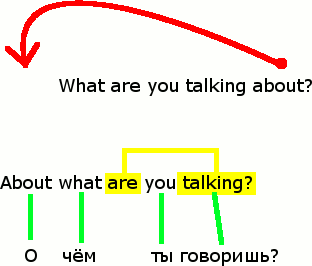Что (часть первая)
The Russian word for ‘what’ is что. Although it is written with the letter ч, the nominative/accusative form of the word is most commonly pronounced [што]; in the other cases we do pronounce ч as ч. It occurs in all six cases:
| Nom | что |
| Acc | что |
| Gen | чего |
| Pre | чём |
| Dat | чему |
| Ins | чем |
Notice that the only difference between the prepositional and instrumental forms is the двоеточие “double dots” over the prepositional form.¹ Remember that the Russians usually do not usually write the double dots, so context will have to tell you how to pronounce those forms. Some sample sentences:
| — Что ты купил? — Овощи и чай. |
“What did you buy?” “Vegetables and tea.” |
| Что там лежит на столе? | What's that lying on the table? |
Somewhere in school every American is taught the rule “never end a sentence with a preposition.” For English it's an assinine rule that has no reasonable justification in the living language.² However, for Russian the rule is real and alive. It's not an artificial rule, as in English, but rather a subconscious part of the living language: no Russian will ever end a sentence with a preposition, not even accidentally. So whenever you are translating a question from English to Russian, and the question ends with a preposition, you need to move that preposition to before its object and then translate. Thus:

Other examples:
| — В чём живут пчёлы? — В ульях. |
“What do bees live in?” “In hives.” |
| — Из чего сделан тот сарай? — Из досок дуба. |
“What's that shed made of?” “It's made of oak boards.” |
| — Чем ты написал сочениние? — Карандашом. — Тогда надо переписать ручкой, а то не примут. |
“What did you write your composition with?” “With a pencil.” “Then you'll have to rewrite it with a pen, otherwise they won't accept it.” |
| — К чему стремятся глобалисты? — К унифицированию всего человечества. |
“What are the Globalists striving for?” “For the unification of all humanity.” |
| — Мы встретились перед памятником Пушкину. — Перед чем? — Перед памятником Пушкину. |
“We met in front of Pushkin's monument.” “In front of what?” “Pushkin's monument.” |
Notice in the last example we can leave the preposition out of the response in English, but in Russian you must retain the preposition to justify the case of памятник.
¹ The double dots symbol is often called a diaeresis or an umlaut. The former is theoretically used to indicate that a vowel is pronounced as a complete vowel (not a diphthong) when preceded by another vowel with which it might blend. The latter is theoretically used to indicate that vowel is fronted. Since neither of those instances prevails in the е/ё distinction, “double dots” is a sensible name for the symbol.
² Of course, one can't mention this rule of English without mentioning Winston Churchill's famous definition: “A preposition is a word you can't end a sentence with.” I actually doubt that Churchill said it, but it's too fun not to mention.
2 comments
To practice writing: instead of the symbol “ч” in informal conversations MSN, ICQ or sending an SMS, we (Russian speaking) often use the symbol “4″ (because the number “4″ = “четыре"). For example:
- 4то сей4ас делаешь?("what are doing now?")
- 4итаю новости. ("I read news")
Don responds: I have had a different interpretation of why 4 is used for ч. In some styles of writing, such as the postal code portion of Russian envelopes, the number four is written without the side bars coming to a point.
Example: Your interpretation also makes a lot of sense.
Actually, you can say it in both ways - with and without “перед". But if the question is for example
— Мы встретились перед памятником Пушкину.
— Где? (or, even Где-где?)
— Перед памятником Пушкину.
then, “перед” is obligatory.
Don responds: Just so that beginners don’t get confused, I should point out that in that example if you say где, then you must not use перед before it, but if you use чем, then you must use перед.
Form is loading...
